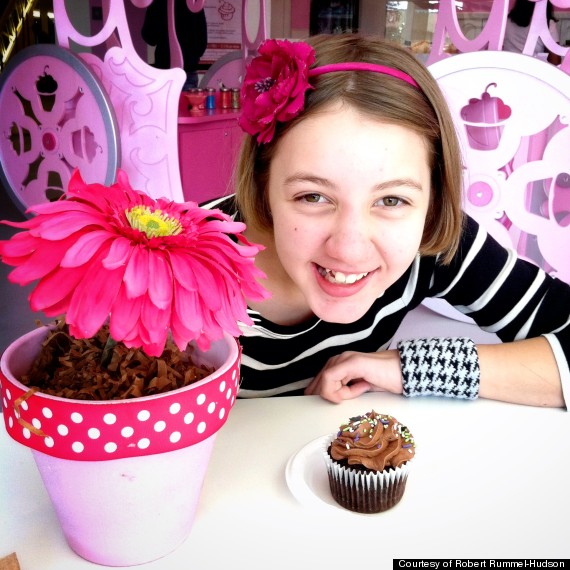
By Robert Rummel-Hudson
It looks like Schuyler may become a cheerleader at her middle school next year.
I don't think anyone would blame you if you thought this sounds like an unlikely outcome for a nonverbal little girl attending a public school. We love to tell our kids, even our disabled children, that if they put their hearts into it, there's nothing they can't do. But in the pragmatic parts of our minds, we secretly hope and pray that they won't ask for things that might prove impractical, if not outright impossible. Schuyler never wanted to sing in choir or join the speech club, but she loves the color guard girls at the high school where my best friend teaches band, and joining a cheer squad might have a similar appeal to her.
To be honest, I never saw Schuyler as a cheerleader, even though she's got plenty of spirit and energy and a love for dancing. The obvious impediment is her lack of intelligible speech, but there are social pieces that present challenges as well.
I realize that memories and experiences from my own school days back in ancient times have unfairly colored my own preconceptions about what being a cheerleader is likely to involve. Having said that, my concerns linger. Schuyler hasn't been outright bullied by the mean girls at her school, to our knowledge, but she's been teased by them before. It's a sad but near universal truth that disabled kids often don't fit into popular crowds. In the best case scenarios, which we've seen hints of from time to time, kids like Schuyler are accepted and even loved by their neurotypical classmates, but with a kind of gentle, unconscious condescension, like a beloved pet.
And the worst case scenarios are predictably awful.
Plus: Meet Schuyler, Monster Slayer
Schuyler's school, however, takes a different approach to cheerleading. I don't know how many public or private schools have a program like this, but at her middle school, the 8th grade cheerleading squad is entirely inclusive. No tryouts, and no experience required. Just show up, pay the fees (which aren't insignificant but cover all manner of expenses, including a uniform, shoes, a long list of clothing items, a backpack and a three-day summer camp), and you're a cheerleader. Practice once a week, cheer at the eighth grade football and basketball games, and perform at a number of parades and other school activities throughout the year.
"This is a leadership position in the school," says the handout that came home to us. That could be Schuyler. That might be a little piece of her future.
I'm all too aware that this approach isn't loved by everyone, so it makes me especially happy that Schuyler's school has made this choice. Inclusion in participatory sports and activities is an easy target for mockery and worse.
Recently, one of those pithy graphics rolled by on my Facebook feed.
"I'm afraid of a world run by adults who were never spanked as kids and got trophies just for participating."
I'm certain that the person who posted this didn't do so with malicious intent. They weren't thinking of Schuyler or kids like her when they put it on Facebook. But maybe that's the point. Perhaps the problem comes from seeing kids with disabilities as exceptions, as existing outside societal norms. They're not talking about our kids, and that's fine as far as it goes. But why aren't they? Why don't they count?
Plus: Is Cheerleading Inappropriate for Little Girls?
It's easy to make fun of the A for effort, the trophy for participation, but the fact is, for Schuyler and countless kids just like her, those trophies are the ones that sit on their shelves. And they're not cheap tokens of faint praise, either. It's impossible to overestimate the hard work and perseverance those trophies represent to kids for whom participation alone is a triumph. That very real accomplishment is made possible by programs like the Special Olympics, or the Miracle League in which Schuyler plays soccer and baseball with other disabled kids, or the inclusive cheerleading squad at her middle school. Schuyler and her friends try so hard to fit into the world. In programs like these, they succeed.
And when Schuyler reaches farther and achieves great things in the typical world, too, as she did when she received a first division rating in her band program's solo competition earlier this year, she does so in large part because of the confidence she gained through inclusive programs. They serve to help her and her disabled friends find their footing in a world that not so long ago was far beyond their reach. And finding that footing, they really might find that there's not much that's out of their reach.
"This is a leadership position in the school." I find a great deal of comfort in that thought. I'm not one bit afraid of a world run by the adults that kids like Schuyler might become, given the chance.
